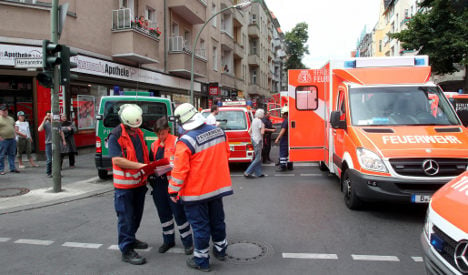Until now the costs of calling the 112 emergency medical help number in the capital has been met by insurers with no question. People with statutory health insurance never saw a bill.
But the <Berliner Zeitung newspaper reported on Tuesday that this could change as of Sunday.
And it could get really expensive. The minimum call-out for an ambulance is €280, the paper said. But find yourself in a mega car crash and need a helicopter airlift to the nearest emergency room? Plan on paying as much as €1,500. Patients can then send the bill to their insurance with the hopes of getting reimbursed.
People who have private insurance are used to paying up front and getting reimbursed, but those on the statutory system have their expenses paid directly by their insurer.
The threat of imposing the fees on patients arose thanks to a fight between the statutory health insurers and the Berlin state government, which controls the fire department. The insurers have complained that they don’t have enough control over costs and that the fire department has billed them too much.
Insurers have paid €67.5 million each year to cover around 240,000 call-outs and the insurers say they have no idea if the fire department actually showed up or what was done or even if the call was necessary, the paper said.
The insurers have been complaining for years about the “lack of transparency and improper calculations” and took the issue to court – twice – and lost both times, after which they cancelled their contract with the fire department.
The fire department reacted by publishing the controversial new fee rules.
“It’s not a good rule,” Berlin state’s Interior Minister Bernd Krömer admitted. He said city officials had been negotiating with the insurers until the end of last week, when the latter walked out of the negotiations. He said the insurers were “trying to blackmail us and we’re not going to accept that.”
The insurers do not want their customers to have to pay for an emergency medical visit by the fire department. They blame Krömer’s department for keeping the fire department bills secret.
In one case the insurers asked for €115 million retroactively to cover 10 years, claiming they had been over charged. In another they sought €5 million for what the insurers said where “medically unnecessary” visits.
Krömer blasted the insurers, saying a letter they wrote to him was “shameful” and that they had confused cause and effect. He demanded that they return to the negotiating table with a reasonable proposal.
“I’m expecting that this time common sense will win – and it better happen quickly.”
A similar row in Hamburg occurred, but the fee was dropped just days before it was to take effect as the two sides were able to reach an agreement.
The Local/mw



 Please whitelist us to continue reading.
Please whitelist us to continue reading.
Member comments